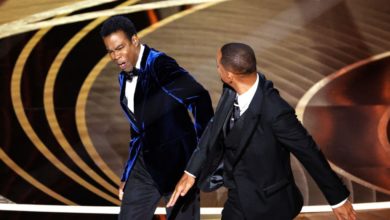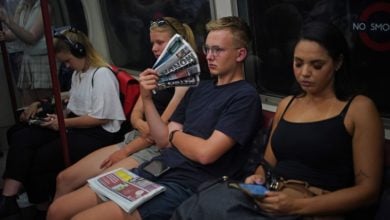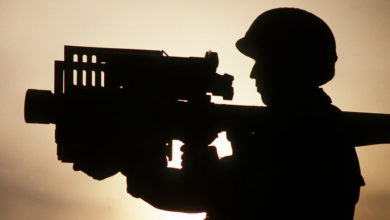What You Need to Know About the Escalating Ukraine-Russia Crisis

WARSAW, Poland — Efforts by world leaders to head off a Russian invasion of Ukraine were dealt a serious blow Monday when Russian President Vladimir Putin signed decrees recognizing the independence of two separatist regions in eastern Ukraine and ordered his military to “maintain peace” there.
But Putin’s moves, made as shelling continued in those regions, could be a precursor to the Kremlin sending in troops and weapons to support the separatists. This could only increase tensions already high between Russia and the West.
A rare nighttime emergency meeting was called by the U.N. Security Council at Ukraine’s request. Ukraine’s president, Volodymyr Zelenskyy, sought to project calm, telling the country: “We are not afraid of anyone or anything. We don’t owe anyone anything. And we won’t give anything to anyone.”
[time-brightcove not-tgx=”true”]
Continue reading: The Ukraine Crisis: An Untold Story
The White House said earlier Monday that President Joe Biden had agreed “in principle” to meeting Putin, but only if the Kremlin refrains from launching an assault on Ukraine. Even before any invasion, however, both Biden and the European Union said they would move ahead with targeted sanctions in response to Putin’s decrees.
The White House has issued an executive order prohibiting Americans from doing business or investing in separatist areas.
A Biden-Putin meeting would offer some new hope of averting a Russian invasion that U.S. officials said appeared imminent, as an estimated 150,000 Russian troops await Putin’s orders to strike. It was uncertain when — or if — troops massing at the border would enter Ukraine.
Let’s take a look at what the recent developments have been in Eastern Europe’s Security Crisis.

Putin acknowledges Donetsk/Luhansk separatists in Eastern Ukraine
In a long, ranting speech during a meeting of his Security Council, Putin charged that Ukraine had inherited Russia’s historic lands and after the Soviet collapse was used by the West to contain Russia.
Putin’s decree allows Russia to sign treaties with the separatist regions and openly send troops and weapons there. It says Russia will offer mutual assistance when requested by rebel leaders to “maintain peace.”
Western officials are worried that Russia may invade Ukraine anytime, and use the skirmishes occurring in Eastern Ukraine to justify an attack.
This decision effectively ends the 2015 Minsk peace agreement, which had ended massive fighting. Violence continues to escalate and there has been an upsurge in violence in the wider crisis.
The meeting of Putin’s Security Council followed televised statements by separatist leaders, who pleaded with Putin to recognize their regions as independent states and sign friendship treaties envisaging military aid to protect them from what they described as an ongoing Ukrainian military offensive. Russia’s lower house made the same plea last week.
Ukrainian officials deny that they launched an offensive. Russia is accused of provocation as Russian shelling increases along the line.

Are Biden and Putin likely to meet again?
According to preliminary agreements, Russian and American presidents will meet to try to stop another Ukrainian invasion. Russia seize Crimea in 2014 from Ukraine.
However, both parties seem cautiously optimistic about any possible meeting.
The White House stated that the meeting would only take place if Russia doesn’t invade Ukraine.
Kremlin spokesman Dmitry Peskov, for his part, said “it’s premature to talk about specific plans for a summit.”
Continue reading: Biden’s Attempt to Discredit Putin in Ukraine
In a series phone calls, the French president Emmanuel Macron tried to facilitate a possible meeting between Biden & Putin. The call lasted into Sunday night. Macron’s office said both leaders had “accepted the principle of such a summit,” to be followed by a broader meeting involving other leaders, too.
Biden, according to the White House on Monday spoke during a 30-minute conference call with Macron and Olaf Scholz (German Chancellor).
U.S. Secretary of State Antony Blinken and Russian Foreign Minister Sergey Lavrov were to lay the groundwork for the summit at a meeting Thursday, according to Macron’s office.

What’s happening now in eastern Ukraine?
Heavy shelling has increased in recent days along the tense line of contact between Ukrainian forces and the Russian-backed separatist rebels in Ukraine’s industrial heartland of Donbas.
The conflict began after Russia’s annexation of Crimea and has claimed at least 14,000 lives.
Ukrainian military spokesman Pavlo Kovalchyuk said Ukrainian positions were shelled 80 times Sunday and eight times early Monday, noting that the separatists were “cynically firing from residential areas using civilians as shields.” He said Ukrainian forces weren’t returning fire.
Continue reading: Blinken Details Nightmare Scenario in Ukraine
In the village of Novognativka on the government-controlled side, 60-year-old Ekaterina Evseeva said the shelling was worse than at the height of fighting.
“It’s worse than 2014,” she said, her voice trembling. “We are on the edge of nervous breakdowns. And there is nowhere to run.”
Russian troops are still in Belarus. This adds to fear
Russian troops who have been carrying out military exercises in Belarus, which is located on Ukraine’s northern border, were supposed to go home when those war games ended Sunday. Moscow and Minsk now claim that Russian troops remain on the ground indefinitely.
Concerns were raised about Russia sending troops to attack Kyiv (the Ukrainian capital) as a result of Russia’s continued presence in Belarus. This is a town of three million people located just three hours from the Belarusian border.
Ukraine’s projects are calm
Despite Biden’s assertion that Putin has made the decision to roll Russian forces into Ukraine, Ukrainian officials sought to project calm, saying they weren’t seeing an invasion as imminent.
Oleksii Raznikov, the Defense Minister of Russia, said Monday that Russia now has 147,000 troops around Ukraine. The Belarusian contingent includes 9,000 soldiers. However, this number does not allow for an offensive against the Ukrainian capital.
Continue reading: The Threat of a Russian Invasion Is Crushing Ukraine’s Economy and Culture
“The talk about an attack on Kyiv from the Belarusian side sounds ridiculous,” he said, charging that Russia is using the troops there to create fear.
Many Ukrainians also returned from work or shopping trips to the Polish border this weekend. Many said that they weren’t afraid of Russia and pledged to fight back against it in the event of an attack.

What’s the E.U. doing about Ukraine? What is the E.U. doing in Ukraine?
Direct military intervention, despite all of the rhetoric and threats of reprisal by Western leaders has been excluded.
Dmytro Kuleba the Ukrainian Foreign Minister said Monday that the European Union agreed to create a mission of military education advisors in Ukraine.
Kuleba told reporters in Brussels after meeting with the bloc’s foreign ministers that an agreement had been reached in principle to roll out the advisory training military mission.
“This is not combat forces,” he said. “This is a new element in the cooperation between Ukraine and the European Union.”
Continue reading: The Future of Europe Could Be Transformed by What Happens in Ukraine
The move could involve sending European officers to Ukraine’s military schools to help educate its armed forces. It’s likely to take several months to set up.
Russia sought assurances from NATO to not offer Ukraine or other ex-Soviet republics membership, which the West rejected.
General Mark A. Milley is the chairman of U.S. Joint Chiefs of Staff. Monday’s conversation was with Lt. Gen. Valery Zaluzhny, commander-in-chief of Ukraine’s armed forces.
Milley called Ukraine a key partner to NATO, according to the Pentagon’s summary of the phone call.
What’s the U.K. doing now?
British Prime Minister Boris Johnson said he was preparing to speak to Zelenskyy and “offer him the support of the United Kingdom.”
Earlier, Britain’s defense secretary, Ben Wallace, urged Putin to turn away from military action and pursue diplomacy not just for the sake of Ukrainians but to prevent Russian deaths.
Russians know the consequences of the past actions, including the invasion of Afghanistan and Russia’s invasion of Chechnya, he said.
“These are just two examples when too many young men returned home in zinc-lined coffins, and the government therefore urges President Putin for the sake of his own people, and even at this 11th hour, to rule out the invasion of Ukraine,” he said.
Continue reading: The Best Way to Stop Putin’s Invasion of Ukraine
Wallace stated to the House of Commons, that Putin was still building up its forces in the area. He stated that Russia now has 65% of its combat force on the Ukrainian frontier.
U.K. Foreign Secretary Liz Truss said the West was preparing “for the worst-case scenario,” adding: “We must make the cost for Russia intolerably high.”
—AP writers Vladimir Isachenkov in Moscow; Yuras Karmanau and Lori Hinnant in Kyiv, Ukraine; Jill Lawless and Danica Kirka in London; Lorne Cook in Brussels, Frances D’Emilio in Rome, Angela Charlton in Paris and Bobby Caina Calvan in New York contributed to this report





